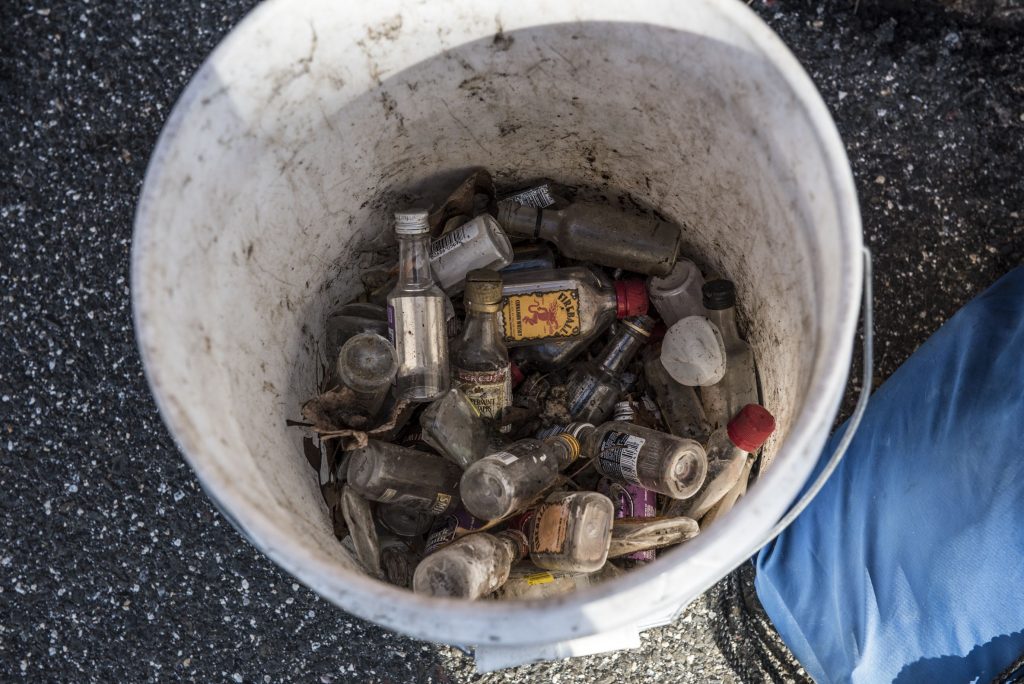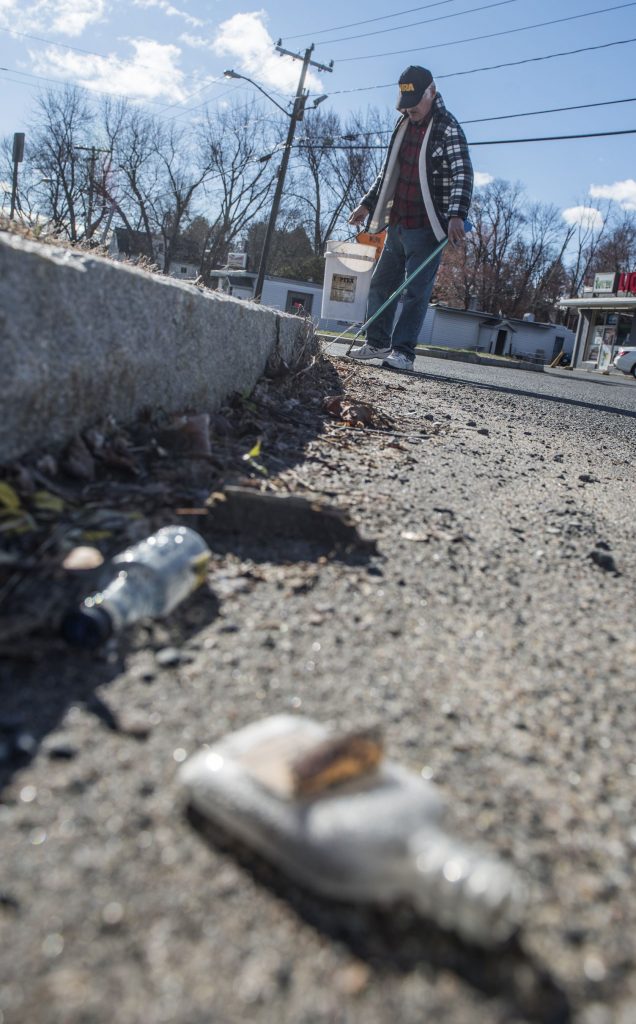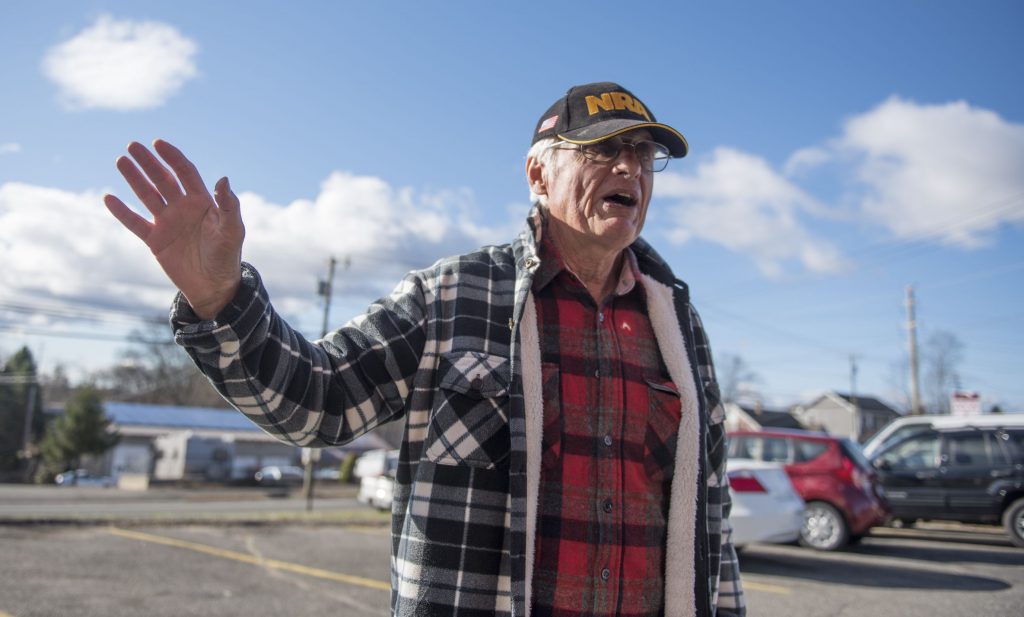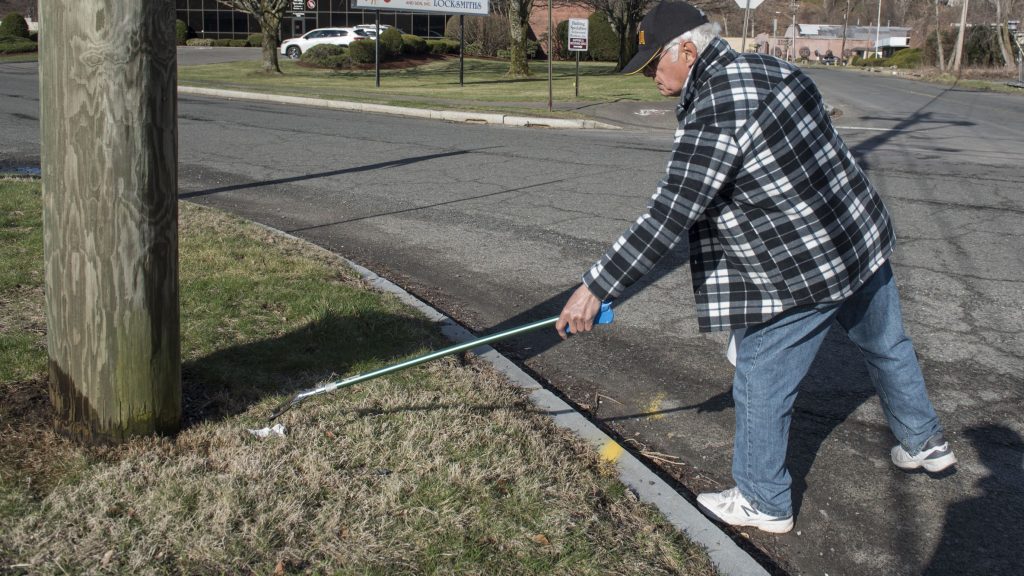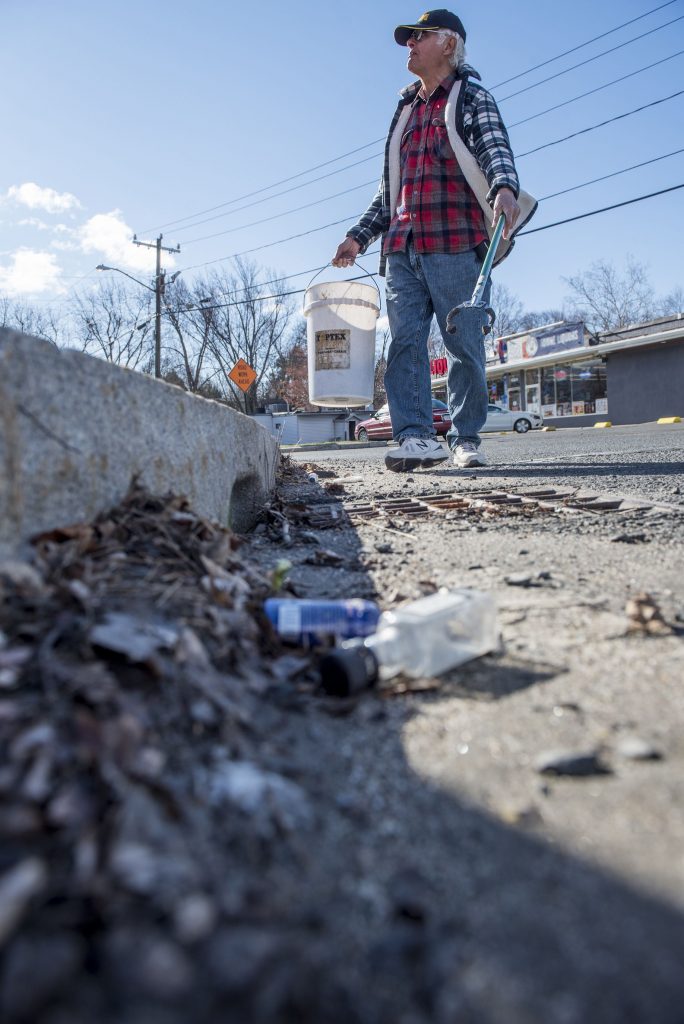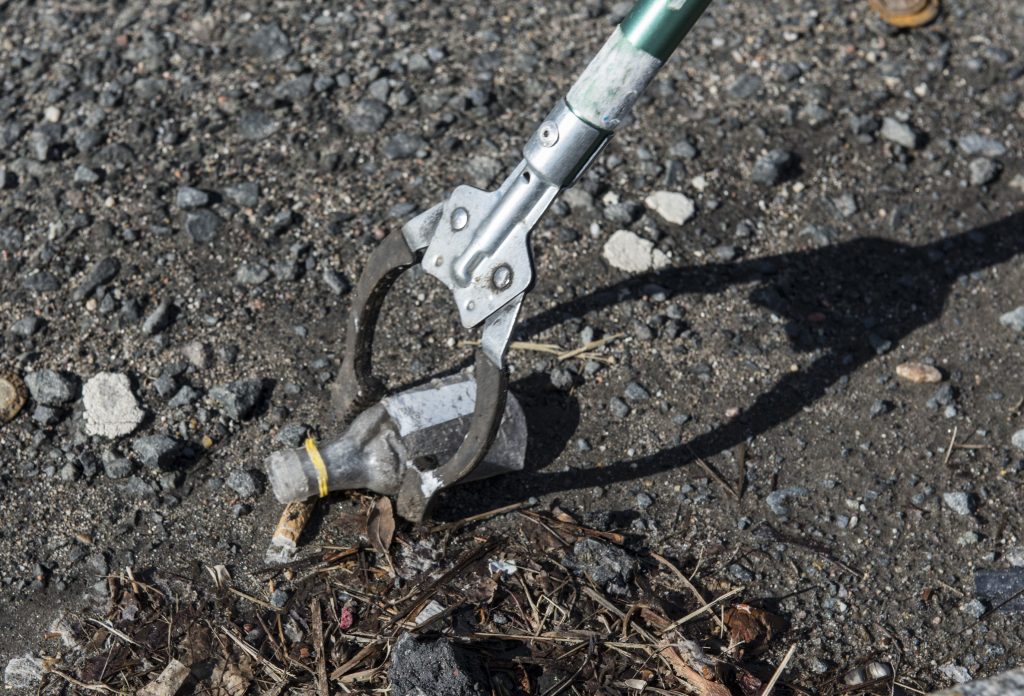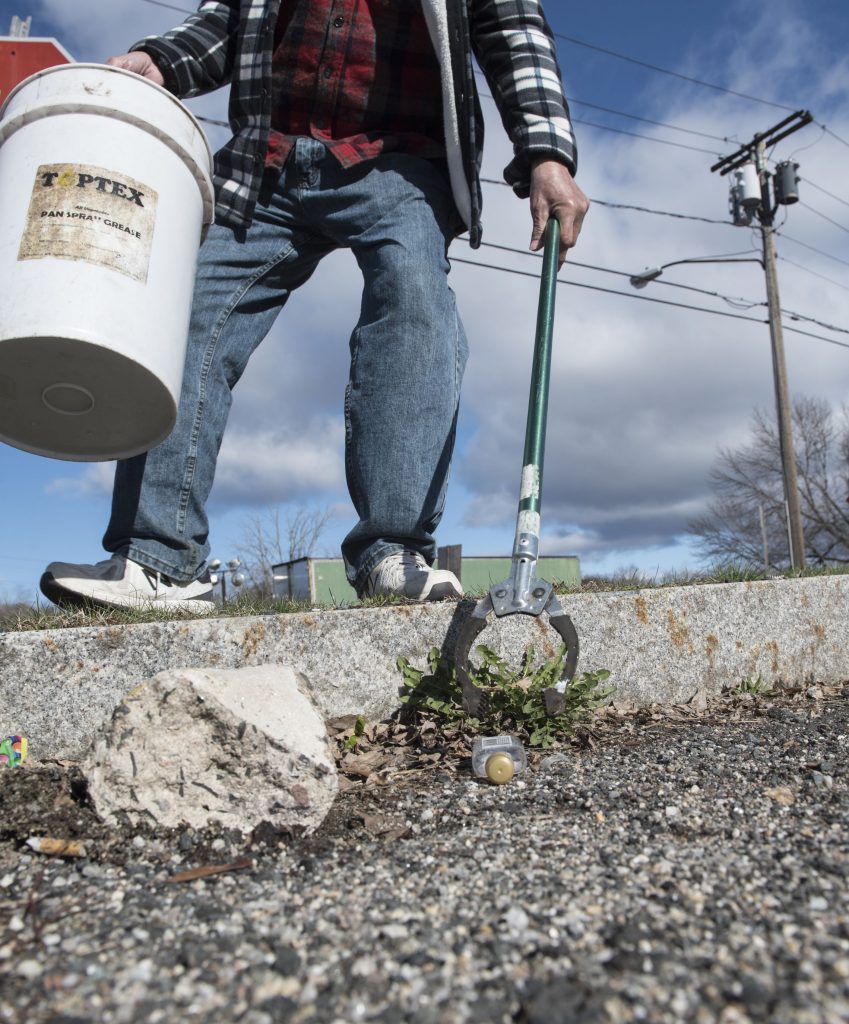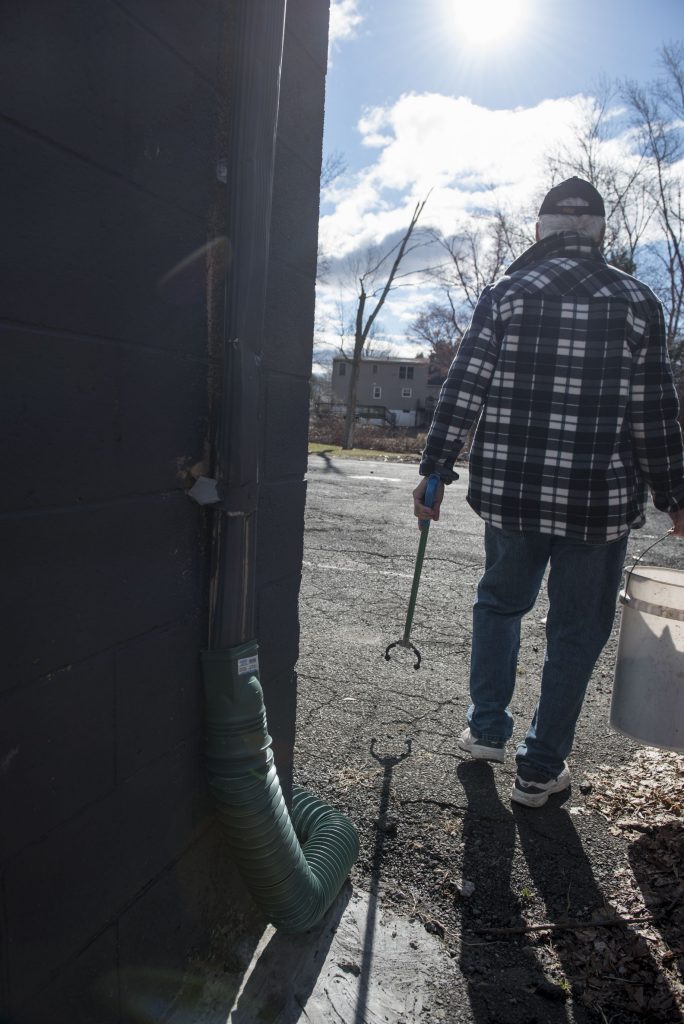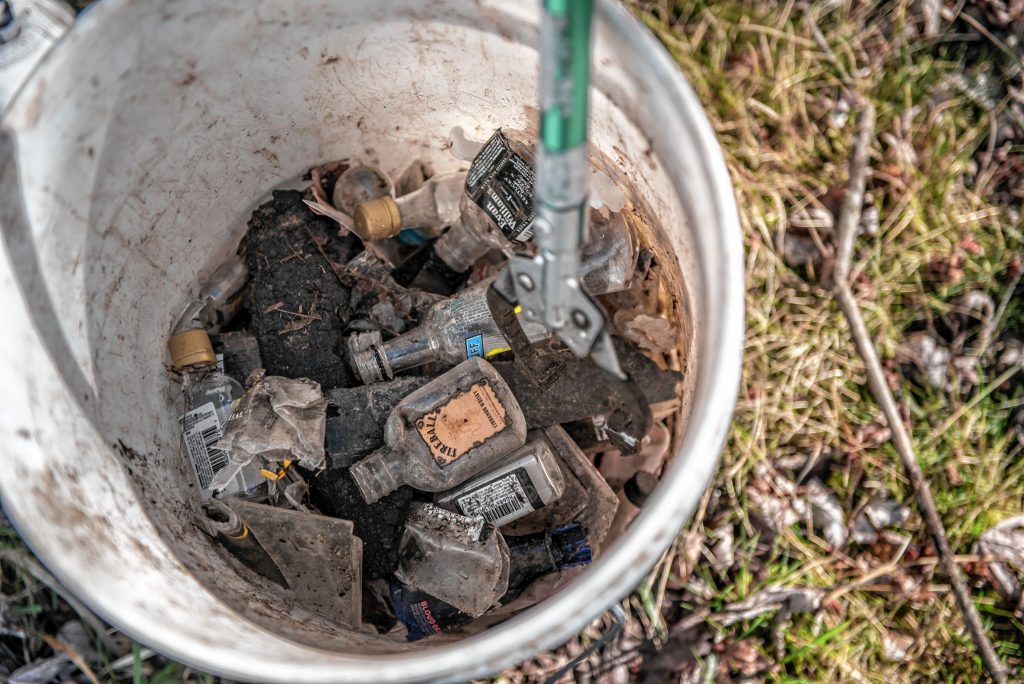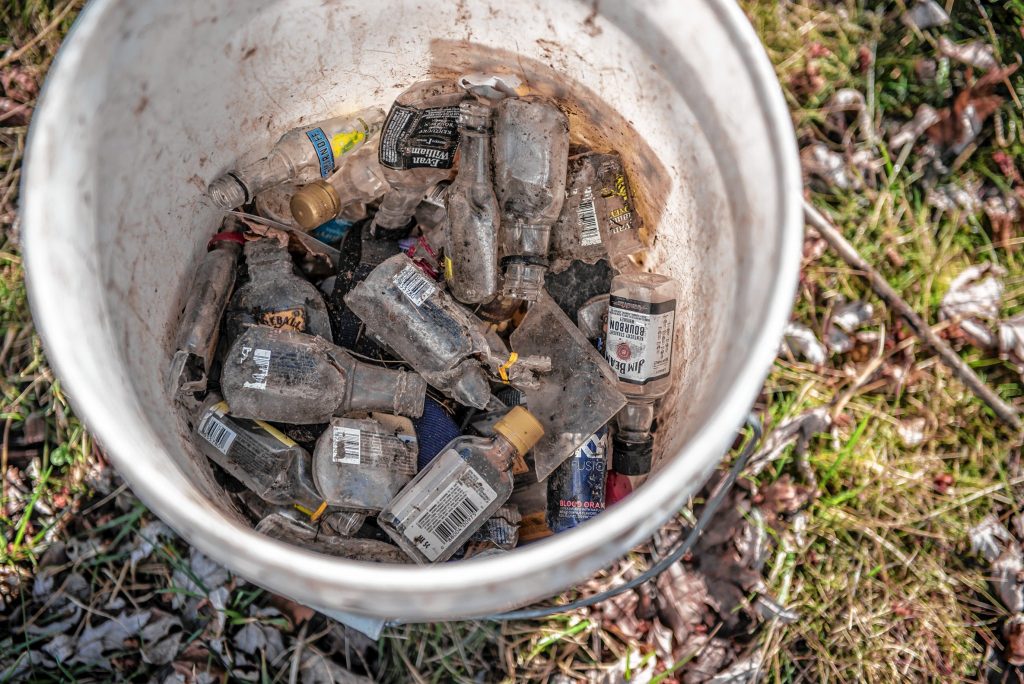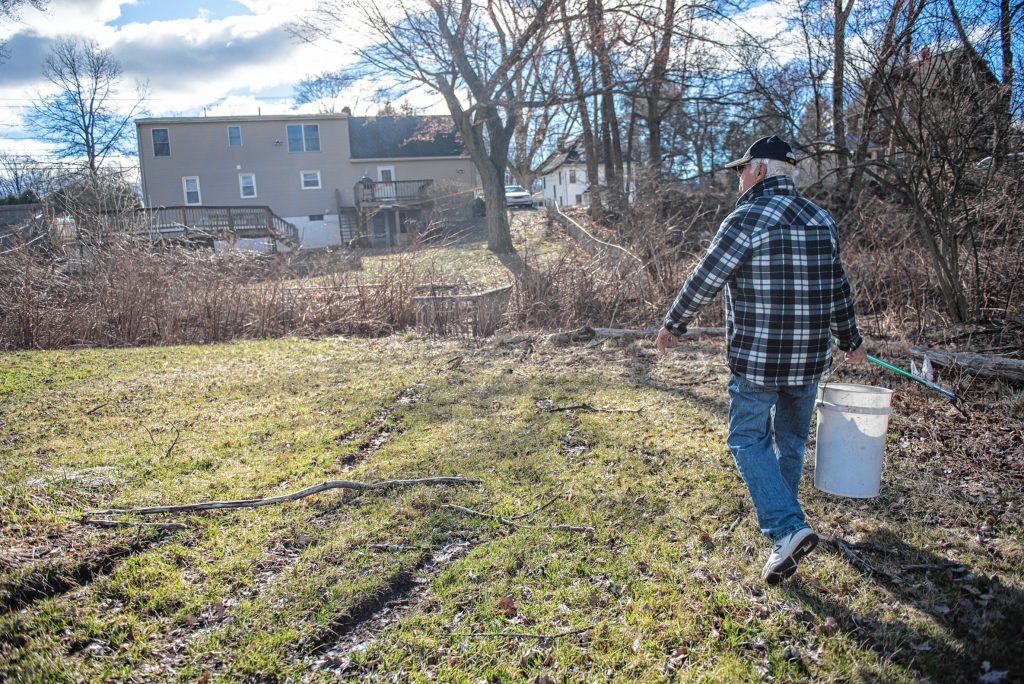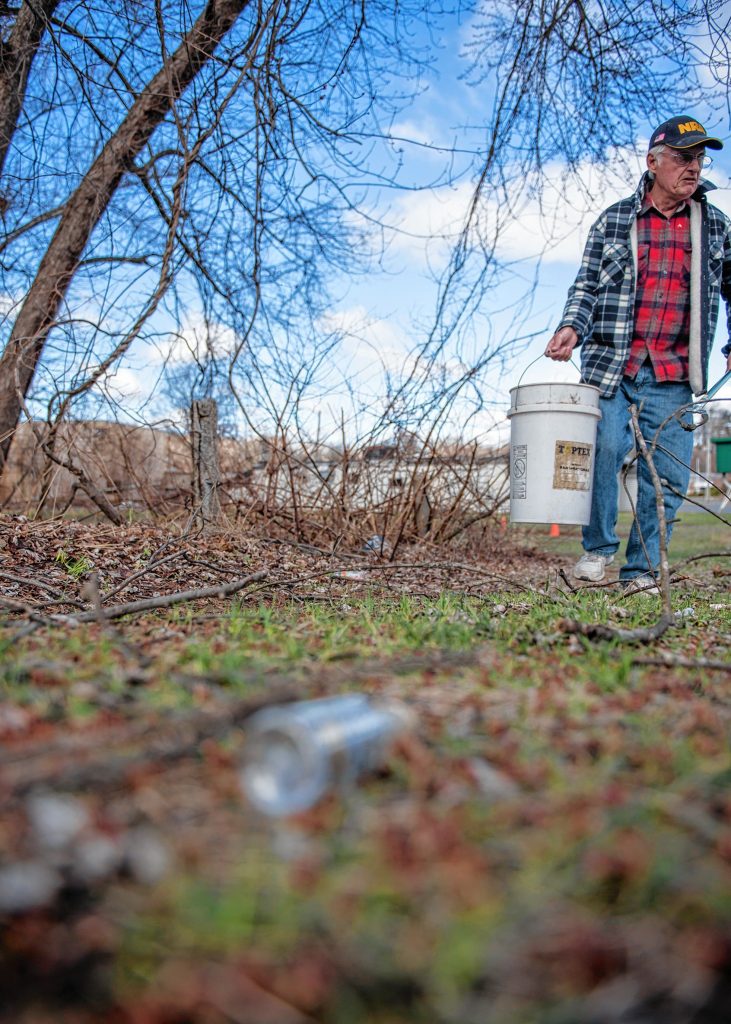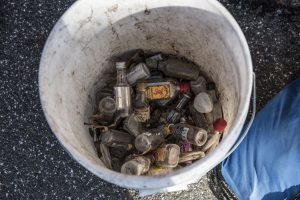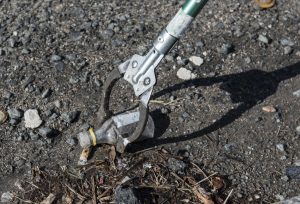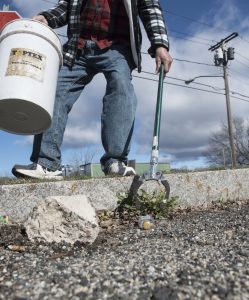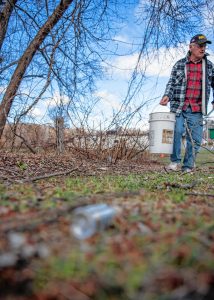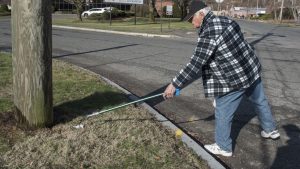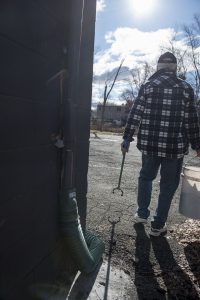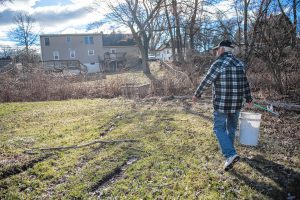A stream runs adjacent to a package store in Agawam. John Coughlin isn’t sure it’s legal for us to be there, but he wants to show me something.
“Look at the nip bottles. Look at them. They’re everywhere,” Coughlin says. Small, smashed plastic bottles are mixed into piles of dead leaves, dried grass and weeds.

John Coughlin picks up trash near his home in Agawam on Wednesday, April 10, 2019. Kevin Gutting photos.
“See the rubbish? It’s so against the law, it’s unbelievable,” Coughlin says. He’s disgusted. He hates all litter, but this litter in particular irks him because it is close to a wetland.
The other day, Coughlin cleaned up the grassy area, but left the part alongside the river untouched.
“I got so mad, I quit. I was cleaning for hours,” he says.
Just about every day, Coughlin, who is retired and living in Agawam, takes it upon himself to spend hours picking up garbage along roads, tree belts, local sports fields, and parking lots. He says he rarely has issues whether he’s on private or public land — people see him cleaning and leave him alone.
His vision is a cleaner planet, starting with places like Maynard Field in Agawam, for example.
“See how clean it is? You won’t see a field as clean and as busy as this in Western Mass. Guaranteed. It’s my bragging right,” Coughlin says. “It’s a beautiful field. It gives me such satisfaction to see it clean,” he says.
But cleaning isn’t his only form of action.
As an activist, Coughlin supports the Massachusetts “miniatures bill,” which he refers to by its Statehouse bill identification: HB 2881. The bill, introduced by state Rep. Randy Hunt, R-Sandwich, aims to expand the existing definition of beverage containers and, if passed, would place 100 milliliter and smaller bottles into the same category as cans and bottles. This would require miniatures — or nips — to be purchased with a five-cent deposit, which could be refunded as can and bottle deposits are now.
“If there’s a deposit, people would pick them up. There’s not even a question in my mind,” Coughlin says. He remembers when a deposit was added to cans and bottles, which resulted into a huge decrease in litter.
Coughlin claims he’s cleaned up millions of nip bottles. When he read about Hunt’s bill on the internet, he called Hunt up and the two chatted. Coughlin spreads the word by telling people he meets to call their state representatives and tell them to support HB 2881.
A household name
Everybody seems to know Coughlin: homeowners along his routes, people enjoying the outdoors, and employees at local businesses and public works departments. They see him cleaning the streets of Agawam, West Springfield, or Slim Shad Point in Holyoke, to name a few places.
“We have a social, moral, and ethical responsibility,” to keep the planet clean, Coughlin says. “We don’t have a choice. The very existence of our planet is at stake.”
The mission is so intricately wound into his life that to understand the man behind it — well, that’s not the point, Coughlin insists.
“I’m 76 years old, 5’8”, 160 pounds, and I walk 10 miles a day,” Coughlin says, before introducing his indispensable tool, a Nifty Nabber. It’s a hand-held grabber, with two prongs to grip trash. With it, Coughlin doesn’t bend over or wear gloves to protect his hands from detritus.
“It’s the best tool ever made,” Coughlin says. “It costs 20 bucks plus tax.”
Coughlin is rarely seen without it.
“My Nifty Nabber goes everywhere with me,” he says. When Coughlin goes to town meetings or to vote, “I go early and clean the parking lot,” he says.
Coughlin says that a lot of people thank him for cleaning. It’s led to recognition from police officers that see him cleaning everywhere to city officials.
“He goes by Jack,” Agawam mayor William Sapelli says. Sapelli has called Coughlin into his office to thank him for the work that he’s done.
“He’s all over town. It’s amazing,” Sapelli says.
Sapelli notes that Coughlin’s dedication to keeping the community clean is seemingly from a bygone era.
“There aren’t many people like him anymore,” Sapelli says, “He doesn’t want anything in return.”
Coughlin isn’t in it for the recognition.
“I’ve been honored so many times I can’t really remember,” Coughlin says after listing some accolades he’s received, including recognition from Holyoke City Council members. “This isn’t bragging. It’s complaining.”
He’s frustrated by the number of people who thank him for cleaning their roads but bristle when he asks them to call their state representative to support HB 2881. He’s baffled by the number of people who enjoy walking or going fishing but aren’t put off by cigarette butts, nip bottles, and other trash.
“I swear to God, they’re desensitized to trash because it has no impact on them, emotionally. It makes me sick — I can’t go for a walk without picking up trash,” Coughlin says.
“You see how passionate I am,” Coughlin says, “I’m an emotional guy. I’m obviously Italian.”
Coughlin’s passion for cleaning was instilled by his parents. Although it wasn’t always an easy journey for a teenaged Coughlin.
“I had to do it everyday. The sidewalk, the tree belt, the gutters,” he said, adding that his parents would send him to his room if he didn’t comply.
“Between you and me, I used to fight it tooth and nail,” Coughlin laughs. “Oh my god, how stupid I was.”
Daily cleaning became a habit. During his lunch breaks on the job, Coughlin would walk outside and clean. He would clean the areas where he fished. As the coach of his son’s soccer team, Coughlin’s players and their parents picked up litter for five minutes both before and after the game. When Coughlin’s son was in his 30s, he told his dad that when he was a kid, his classmates called him “five-minute pick up.” Coughlin retired in the ‘90s and has been cleaning full time ever since.
Changing the law
Like Coughlin, Hunt has been interested in keeping the environment clean since he was a kid. Hunt remains inspired by Lady Bird Johnson’s “Keep America Beautiful” campaign.
“I hate it when I get to a place that ought to be pristine and it looks like there was a rave the night before. It just drives me crazy,” Hunt says.
Hunt first introduced the miniatures bill last year, after speaking with an exasperated constituent, who, much like Coughlin, spends a lot of time cleaning in his district.
“The issue that I’m looking [to address] is to give people an incentive to pick up the nip bottle next to the coke can lying right next to it,” Hunt says.
Currently, nips are not recyclable in Massachusetts.
Susan Waite, the waste reduction coordinator for the city of Northampton, commented on recycling based around the Springfield Materials Recycling Facility, or MRF (pronounced “murph”).
“The short answer is that small bottles like that are not desired at the MRF,” Waite says. “They fall through the cracks in the machinery.”
Waite explains what she calls “recycling commodity 101.”
“Technically, anything can be recycled,” Waite says. A material needs to be recycled with specific machinery. Local facilities that lack the equipment need space to store the material before sending it to another facility that can do the recycling, Waite says. What drives this whole exchange is a market for the material.
“You have to have a buyer,” she says.
If nip bottles are collected by a deposit, it doesn’t necessarily mean that they will be recycled, she adds.
Hunt’s primary concern isn’t about the recyclability of nips, although that would be nice, he says. He hopes that adding a deposit will create a culture of picking up the bottles to reduce litter on the ground.
“We have many more sponsors from our senators and reps than we did last year,” Hunt says. Out of 200 legislatures, 76 support the bill, Hunt says.
In 2017, Maine passed a bill, L.D. 56, that requires a five-cent deposit on nip bottles, which went into effect January first of this year.
The bill was passed — and vetoed by then-Gov. Paul LePage — before the veto was overruled by a 114-31 vote in the state Legislature.
Like Coughlin, Anne-Marie Mastraccio, a Maine state representative that cosponsored the bill, noticed a huge uptick in the past few years of nip bottle litter strewn along her walking routes.
“It was a problem that was easy to illustrate,” Mastraccio says, adding that the comparison of increased nip sales with an increase in nip bottle litter all over Maine, as one reason why the bill passed with overwhelming bipartisan support.
Although she hasn’t been walking as much due to the weather, Mastraccio says she sees the bill’s effect.
“Where I’ve gone recently, I haven’t seen any. None,” Mastraccio says.
Hunt hopes that any questions Massachusetts legislators have will be answered by Maine’s lead.
Hunt says that the bill is currently in the joint committee on Telecommunications, Utilities and Energy. If it passes, it will go to the Ways and Means committee, then into third reading, which means that the bill is in its final state and will be assigned a date to vote on.
“I just want to make a straight forward change. There are a lot of small steps and we have to take the first one,” Hunt says.
Storm drain danger
Coughlin cleans along roads because he knows litter ends up in storm drains. A few years ago, his primary concern and ubiquitous source of litter was cigarette butts. Now, with the increase in nip bottles that he’s seen in the past few years, they’re both his top two concerns.
He traces the path of a cigarette butt washing down a storm drain into a stream which merges with the Connecticut River, which in turn empties into the Long Island Sound and into the Atlantic Ocean.
 Although she’s never met Coughlin, Angela Chaffee, the communications director at the Connecticut River Conservancy, agrees with Coughlin’s assessment and push for legislation.
Although she’s never met Coughlin, Angela Chaffee, the communications director at the Connecticut River Conservancy, agrees with Coughlin’s assessment and push for legislation.
“The biggest connection is storm drains. When it rains, trash gets picked up and carried down into our storm drains,” Chaffee says. “Nips and cigarette butts and those tiny pieces of trash, those things fit right down there.”
Often litter will break down into small pieces but it will not biodegrade, Chaffee says.
“We don’t see it anymore but it doesn’t mean that it’s not still there,” Chaffee says, calling miniscule pieces of plastic “very persistent” trash.
The Connecticut River Conservancy, a nonprofit located in Greenfield has stewards along the river from its source at the border with Canada and down to Long Island Sound. It hosts an annual river clean up, now in its 23rd year.
Chaffee agrees with Coughlin that broader changes need to happen to keep the environment clean and safe.
“We’ve been doing the clean-up for decades. [But] going out there every year isn’t solving the trash problem,” Chaffee says.
Year-round advocacy is a focus of the Connecticut River Conservancy, which has worked to support bottle bills in both Massachusetts and Connecticut. Bottle redemption in Connecticut accepts a wider variety of bottles, like plastic water, juice, and tea bottles, Chaffee says.
“That’s what history has shown: If you attach that refund, it adds value to the piece of trash. When trash has value, it is less likely to end up on the side of the road or in a landfill,” she says.
Catching Coughlin in action
A blustery Wednesday morning, Coughlin walks along Suffield Street. He walks upright, eyes scanning ahead for the next piece of trash from under his black baseball cap.
Constantly telling a story, Coughlin quickly shifts between the importance of cleaning the planet, his frustration over people’s indifference, and back to the dire need for action to be taken — all punctuated by sightings of nip bottles.
“See, here’s another nip bottle. This is what’s happening in America,” Coughlin says.
Trash goes into a five-gallon bucket over his arm, which is emptied into 55-gallon, triple strength trash bags. Coughlin leaves them and calls the town’s DPW to come pick them up.
Along the sidewalk, Coughlin picks up wet newspapers, nip bottles, and cigarette butts as he tells me about complications from the last time he was here cleaning.
“I was so friggin’ tired. I couldn’t remember what street I was on,” Coughlin says.
Coughlin pauses the story. His attention focuses on a chunk of rusted, metal debris. He nabs it up. “Wow, that weighs a ton. I’ll get that on the way back,” he says.
A few paces and a few pieces of detritus later, Coughlin resumes his story. He got a tip on how dirty Walnut Street Extension was. “So now, what was just a walk to see what street the contractor bag was on turned in another three hours [of cleaning],” Coughlin says. He didn’t get home until 9 at night.
Coughlin shows me a wooded area with dead leaves blanketing an embankment.
“See the nips! On the part I cleared already,” he says.
We cross the road to an area that was pristine a few days ago. Along the way, I’m trying to get information out of Coughlin about his life.
He tells me a few things: He grew up in Indian Orchard. As a kid, he took the bus to Ludlow, where he played hockey and soccer. He graduated high school and worked at MassMutual. His son lives in East Longmeadow and his daughter in Springfield.
But above all, he is focussed on his mission — cleaning up the trash — and baffled by the interest in the man who has taken it upon himself to take that mission on.
“I don’t want — this isn’t about me. The story isn’t about me,” Coughlin says, exasperated after another question about his life. “We need people to sign onto HB 2881. We need people to clean up, at the very minimum, their tree belts.”
Coughlin is an outdoors person and says he doesn’t understand why people don’t have the same passion for the environment as him.
“When shad fishing comes, I’m there,” Coughlin says. He brings his Nifty Nabber and talks to other fishermen, asking them to pick up litter, even if they didn’t put it there in the first place.
“I’m as polite and as diplomatic as they come,” Coughlin says. Although sometimes, he says, it doesn’t go over well.
“I hear them when my back is turned. They call me every name in the book,” Coughlin says, adding that he doesn’t harbor ill will. “I’m on your team. I’m not your enemy. I’m going to be gone long before you.”
Making a difference
Near Coughlin’s apartment complex are a number of stores with pristine parking lots.
I ask a few businesses about their neighbor.
“He’s — what do you call it — crazy,” Joe Faria says with a smile. Faria has been the owner of Cheers Liquor store in Agawam for the past 18 years, and met Coughlin when Coughlin moved into an apartment a few doors down five years ago.
Coughlin is a regular. He was there the other night to watch the Celtics game. He doesn’t drink — “I may have one beer every six months,” Coughlin says. He’s there to talk to everyone, especially those who buy nips.
“I tell them, ‘Please don’t let them end up in the parking lot.’ I say to them, ‘Don’t let them fall out of your car,’” Coughlin says.
Coughlin pulls a morning shift at the store — he cleans the parking lot before it opens. The nips and cigarette butts easily wash down the storm drain, he reminds me.
Having known each other for half a decade, Faria knows what sets Coughlin off.
“He don’t like to see everybody throw anything out — cigarette butts, plastic cups… especially the cigarette butts,” Faria said.
Faria seems unphased by Coughlin’s relentless mission.
“Sometimes, I agree. Sometimes, I disagree. Most of the time, I like to piss him off,” Faria says with a chuckle. “He does a good job in town,” he adds.
Faria says that nips cost between one and six dollars, and doubts that adding a few extra cents will hurt business.
Shaking hands, Faria told me to go across the street to the pizza joint and speak with Dario. And look at the red bucket outside. That’s because of Coughlin.
Outside of Peppo’s Pizza sits a red “bucket” with a shape that reminiscent of a grill tank. It’s topped with an ashtray. Inside, Dario Odierna, 25, explains it was Coughlin who suggested installing the ashtray, calling him a “very nice guy.” Odierna has been working at Peppo’s Pizza since it opened eight years ago and has known Coughlin since he arrived down the road.
“You want to create awareness about nature and to protect it,” Coughlin says. Reflecting on his unique position as fit septuagenarian with name recognition, Coughlin notes how his diligence gives him respect, which makes it easier for him to be a vociferous activist.
“I’m in the position to do what I want, how I want,” Coughlin says.

